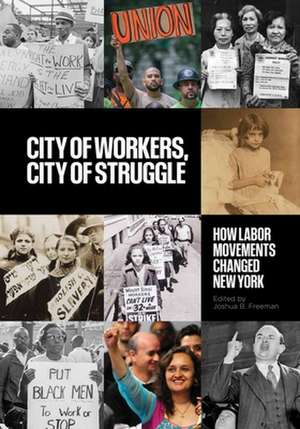City of Workers, City of Struggle – How Labor Movements Changed New York: Columbia Studies in the History of U.S. Capitalism
Autor Joshua B. Freemanen Limba Engleză Paperback – 27 mai 2021
| Toate formatele și edițiile | Preț | Express |
|---|---|---|
| Paperback (1) | 107.60 lei 3-5 săpt. | +28.01 lei 7-13 zile |
| Columbia University Press – 27 mai 2021 | 107.60 lei 3-5 săpt. | +28.01 lei 7-13 zile |
| Hardback (1) | 336.00 lei 3-5 săpt. | |
| Columbia University Press – 23 mai 2019 | 336.00 lei 3-5 săpt. |
Preț: 107.60 lei
Nou
Puncte Express: 161
Preț estimativ în valută:
20.59€ • 21.42$ • 17.26£
20.59€ • 21.42$ • 17.26£
Carte disponibilă
Livrare economică 20 februarie-06 martie
Livrare express 06-12 februarie pentru 38.00 lei
Preluare comenzi: 021 569.72.76
Specificații
ISBN-13: 9780231191937
ISBN-10: 0231191936
Pagini: 248
Dimensiuni: 176 x 248 x 16 mm
Greutate: 0.68 kg
Editura: Columbia University Press
Seria Columbia Studies in the History of U.S. Capitalism
ISBN-10: 0231191936
Pagini: 248
Dimensiuni: 176 x 248 x 16 mm
Greutate: 0.68 kg
Editura: Columbia University Press
Seria Columbia Studies in the History of U.S. Capitalism
Notă biografică
Joshua B. Freeman is Distinguished Professor of History at Queens College and the Graduate Center of the City University of New York. His books include Behemoth: A History of the Factory and the Making of the Modern World (2018); American Empire, 1945¿2000: The Rise of a Global Power; the Democratic Revolution at Home (2012); and Working-Class New York: Life and Labor Since World War II (2000).
Descriere
Descriere de la o altă ediție sau format:
City of Workers, City of Struggle brings together essays by leading historians of New York and a wealth of illustrations, offering rich descriptions of work, life, and political struggle. It recounts how workers have built formal and informal groups not only to advance their own interests but also to pursue a vision of what the city should be.
City of Workers, City of Struggle brings together essays by leading historians of New York and a wealth of illustrations, offering rich descriptions of work, life, and political struggle. It recounts how workers have built formal and informal groups not only to advance their own interests but also to pursue a vision of what the city should be.














